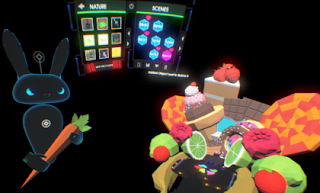It was reported by TechCrunch that even if Google's early efforts in VR and AR may not have reached the average Android user, as the company scales its vision for what augmented and virtual reality mean to its overall business, it's been devoting major attention as of late to the developers that have taken to building early experiences.
Recently, the company announced an extension to their ever-expanding pipeline for crafting and integrating 3D objects into games and experiences, the Poly API.
It will let developers integrate the "thousands" of 3D objects the company has in its Poly library directly into their titles. The API represents yet another step in the company's efforts to court AR/VR developers with useful tools that expand beyond the company's Daydream and ARCore platforms.
Poly, which Google announced last month, turned the fun of the object-crafting Blocks software and the VR painting Tilt Brush into something more useful to developers shopping around for 3D objects. Google is also launching a specific Poly Toolkit for developers building in Unity and Unreal so they can easily import objects directly without added fuss.
The Poly API is by no means limited to AR and VR applications and games - developers crafting content for mobile and desktop won't have to jump through any hoops to integrate the objects - but it's clear that the tool fits into a broader creative vision for capturing game engine-savvy developers building content for AR and VR.
Google has already begun partnering with some of these groups to show the potential of the Poly API.
One of these early partnerships is with Austin-based TheWaveVR, which will be allowing users to construct scenes utilizing 3D content from Poly for the virtual reality rave/concert app. Users can build what are called "waves," trippy audiovisual experiences that accompany concerts and contribute heavily to the emotional cyberpunk Burning Man vibes that the app has to it.
It's VR and AR so there's obviously huge potential for designing worlds made up of these 3D objects. What Unity and Unreal are building may constitute the bigger piece of the pie, but as Amazon ventures into AR/VR game development with Sumerian, it's clear that there's a lot of room for expansion among all the big players and that incumbents shouldn't feel secure.
Recently, the company announced an extension to their ever-expanding pipeline for crafting and integrating 3D objects into games and experiences, the Poly API.
It will let developers integrate the "thousands" of 3D objects the company has in its Poly library directly into their titles. The API represents yet another step in the company's efforts to court AR/VR developers with useful tools that expand beyond the company's Daydream and ARCore platforms.
Poly, which Google announced last month, turned the fun of the object-crafting Blocks software and the VR painting Tilt Brush into something more useful to developers shopping around for 3D objects. Google is also launching a specific Poly Toolkit for developers building in Unity and Unreal so they can easily import objects directly without added fuss.
The Poly API is by no means limited to AR and VR applications and games - developers crafting content for mobile and desktop won't have to jump through any hoops to integrate the objects - but it's clear that the tool fits into a broader creative vision for capturing game engine-savvy developers building content for AR and VR.
Google has already begun partnering with some of these groups to show the potential of the Poly API.
One of these early partnerships is with Austin-based TheWaveVR, which will be allowing users to construct scenes utilizing 3D content from Poly for the virtual reality rave/concert app. Users can build what are called "waves," trippy audiovisual experiences that accompany concerts and contribute heavily to the emotional cyberpunk Burning Man vibes that the app has to it.
It's VR and AR so there's obviously huge potential for designing worlds made up of these 3D objects. What Unity and Unreal are building may constitute the bigger piece of the pie, but as Amazon ventures into AR/VR game development with Sumerian, it's clear that there's a lot of room for expansion among all the big players and that incumbents shouldn't feel secure.


No comments:
Post a Comment